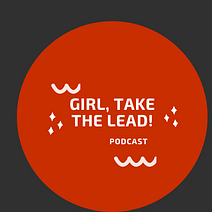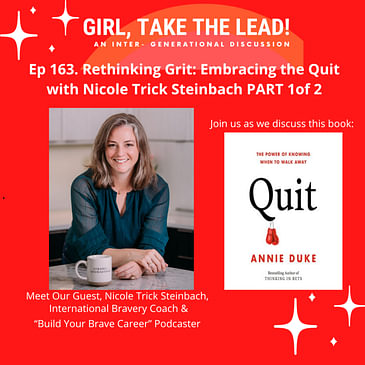Nicole Trick Steinbach (Millennial) returns to the show to discuss the book, Quit, The Power of Knowing When to Walk Away, by Annie Duke. Annie Duke is a former professional poker player and earned more than $4 million in tournament poker before retiring in 2021.
Nicole and I had so much fun talking and I wanted to save every minute of our conversation, I decided to break the episode up into two parts. This is Part 1 of 2. Below are the different topics we covered by part.
Part 1: Grit vs Quit Intersectional Identity & Staying Too Long Nicole’s “Time to Leave” Scale Risk & Expected Value Whispers, Missiles, & Bricks The “At the Moment Manager”
Part 2: Goals & Expected Outcomes Stressing Less & “Sunday Scary” A “Quit Coach” & 4 Steps to Quit Conversations Kill Criteria & Cut Your Loss Attachment to our Self Identity & “In Love with my own Self-Importance” Battles Worth Having The “Ant Story”
Mentioned in the Series:
Book: Quit, The Power of Knowing When to Walk Away
Ep. 6, Can’t We Ditch Performance Appraisals?
Ep. 115 Inside Out: Unveiling the Layers of the Internal Family System (IFS) with Uri Talmor
Related Episode:
Ep 113, Dare to be Brave: Conquer Failure & Learn Bravery as a Skill!
Yo’s Feb 12, 2024 appearance on Nicole’s Podcast:
Here are the three takeaways from the series:
1. In our culture we see grit as a virtue and quit as a vice. Per Annie Duke: “Success does not lie in sticking to things. It lies in picking the right thing to stick to and quitting
the rest.”
2. Any decision is made under some degree of uncertainty – we don’t have crystal balls and new information will always reveal itself.
3. External validation increases the escalation of commitment. Fear of how others will view us if we quit are usually overblown.
Nicole’s Free Offer:
www.TrickSteinbach.com // freebie: https://tricksteinbach.com/work-less/
Sign up for access to a powerful video and workbook combo designed to cut between one and three hours of work each week.
More About Nicole:
Nicole Trick Steinbach is the international bravery coach. She is a former executive in technology, has worked in over 25 countries, and is at home in both the US and Germany. Nicole is a lot of things but naturally brave is not one of them. That’s why she teaches and coaches other women all over the world to build their own brave career so that they stress, work less and then begin to earn more. Her podcast is “Build Your Brave Career with Nicole Trick Steinbach”.
How to reach Nicole:
Linkedin: https://www.linkedin.com/in/nicoletricksteinbach/
Build Your Brave Career with Nicole Trick Steinbach Podcast: https://podcasts.apple.com/es/podcast/celebrate-brave-with-nicole-trick-steinbach/id1563427212?l=en
How to reach Yo Canny:
Our website:
You can send a message or voicemail there. We’d love to hear from you!
email:
FB group: Girl, Take the Lead
https://www.facebook.com/groups/272025931481748/?ref=share
IG:
yocanny (Yo)
LinkedIn:
https://www.linkedin.com/in/yocanny/





